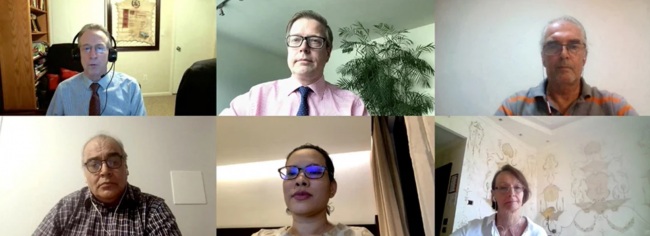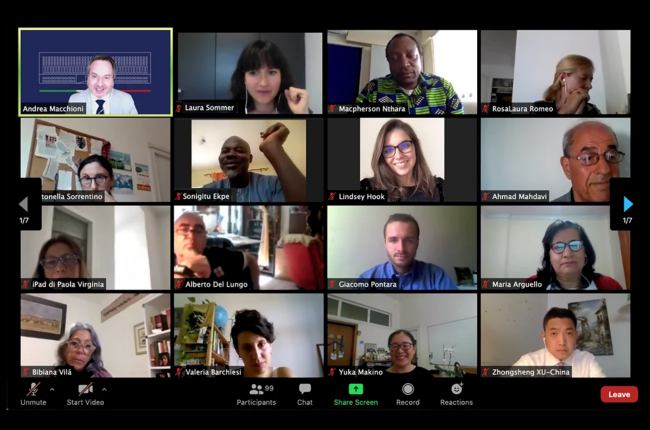The following events were covered by IISD on Thursday, 9 July 2020:
-
Forests and Transformative Pathways to Sustainability
-
Mountains and the Decade of Action and Delivery
Forests and Transformative Pathways to Sustainability
Presented by the International Union of Forest Research Organizations (IUFRO), World Wildlife Fund (WWF), Ministry for Foreign Affairs of Finland, and Natural Resources Institute Finland
This event, held virtually on the sidelines of the 2020 High-level Political Forum on Sustainable Development (HLPF), addressed the role of forests and forestry in accelerating transformative pathways to sustainable development. Participants described approaches to transformative change for the forests-food-energy-climate nexus and their potential and limitations, emphasizing equity, gender, and governance.
In addition, the session illustrated the potential for synergies among the Sustainable Development Goals (SDGs) that focus on sustainable land and resource use. It also emphasized the importance of policies and regulatory environments and capacities that support and incentivize sustainable forest-related livelihoods and development.
The event sought to build on work undertaken by IUFRO’s Special Project on World Forests, Society and Environment (WFSE). It also built on the recent publication Sustainable Development Goals: Their Impacts on Forests and People.
Glenn Galloway, University of Florida, moderated the session. In opening remarks, Amb. Jukka Salovaara, Permanent Representative of Finland to the UN, highlighted the role of forests for humanity. He explained that the COVID-19 pandemic has increased the appreciation for forests, and recognition of the need to preserve natural habitats.
Discussing forests and forestry in transformational change, Wil de Jong, Kyoto University, reviewed planetary models, which enable staying within or returning to environmental conditions within planetary boundaries. He reported on their links to achieving the SDGs. He concluded that forest-based transformation pathways enhance restoration of sustainable land use systems, freshwater use, ecosystem functions such as climate mitigation, and biodiversity restoration.
Pablo Pacheco, WWF, presented on forest-specific sustainability toward wider transformative change. He highlighted five major global challenges faced by humanity that need to be addressed, including:
- reversing the rapid progress of biodiversity loss;
- keeping global temperature rise to below 1.5°C;
- meeting the dietary needs of 10 billion people and maintaining food security;
- sustaining human health and preventing pandemics; and
- securing the provision of renewable energy.
Discussing levers of change across complex systems, Pacheco noted solutions from forests, including: preventing zoonotic diseases such as COVID-19 by ensuring the balance between pathogens and host species is restored; recognizing the contribution of indigenous peoples and local communities; forest conversion moratoria; and agroforestry. He urged scaling up and accelerating forest management and restoration to ensure transformation in three areas: markets, value chains and food systems; collaboration, equity and wellbeing; and embracing multiple values of forests.
Speaking on advancing the commitment to “leave no one behind,” Bimbika Sijapati Basnett, Center for International Forestry, said equity, gender, and governance are central to achieving transformative pathways. COVID-19, she reported, has exposed levels of gender inequalities in several areas including jobs. She said the pandemic has caused a spike in gender violence. She stressed the importance of gender equality for sustainability and for enabling the forest sector to contribute to the SDGs. She also highlighted the role of environmental justice in ensuring parity in participatory processes. SDGs 5 (gender equality) and 10 (reduced inequalities), she reported, are key to the discourse on environmental justice and recognition of communities’ rights. She called for policies that address grassroots level inequalities between the “haves and the have nots.”
Pia Katila, Natural Resources Institute Finland, discussed the link between forests and the SDGs, emphasizing the potential of forests to achieve sustainable development. She cited pathways to build and strengthen positive synergies among SDGs, including: sustainable production; reduced use of traditional wood fuels; improved resource efficiency; and sustainably managed and efficient use of natural resources. She also emphasized the importance of policy and regulatory environments and capacities that support and incentivize sustainable forest-related livelihoods and development.
During the discussion, participants highlighted: the role of carbon credits in transformative pathways; the role of women as custodians of nature; and ways to promote sustainable practices in traditional energy sources and the transition to renewable energy. They also discussed the impacts of infrastructure development, such as roads to forest settlements, which, consequently, drive forest degradation.
The event took place on 9 July 2020 in a virtual format due to the COVID-19 pandemic.
Contact
Pia Katila, Natural Resources Institute Finland | pia.katila@luke.fi
More Information
Mountains and the Decade of Action and Delivery
Presented by the Government of Malawi, with the Mountain Partnership, and the Governments of Argentina, Kyrgyzstan, Italy and Switzerland
Held on the sidelines of the 2020 High-level Political Forum on Sustainable Development (HLPF), this virtual event highlighted the crucial role of mountain communities in advancing the UN Decade of Action 2020-2030 and achieving the Sustainable Development Goals (SDGs), particularly in light of the impacts of COVID-19. The event provided the opportunity to identify strategies, promote actions, and build commitments to support sustainable mountain agriculture, biodiversity, and livelihoods.
The Mountain Partnership, a UN voluntary alliance of governments, intergovernmental organizations, civil society, and the private sector, has endorsed a Framework for Action to increase and coordinate efforts of its members towards implementation of the 2030 Agenda. The Partnership’s Secretariat is hosted by the Food and Agriculture Organization of the UN (FAO).
Opening the event, Macpherson Nthara, Ministry of Agriculture and Food Security, Malawi, emphasized the need to establish long-term processes and policies that strengthen the resilience of mountain peoples and environments. He welcomed support for the proposal for an International Year of Mountains in 2022.
Carla Mucavi, Director, FAO Liaison Office in New York, discussed the ways in which mountains help achieve the SDGs by providing biodiversity, food, water, and clean energy to all. She considered the amplification of challenges posed by the pandemic in mountain regions, calling for supportive policies, investments, and actions to build resilience and achieve zero hunger.
Silvia Vázquez, Ministry of Foreign Affairs, Argentina, shared her country’s efforts to mitigate impacts adversely affecting mountain regions, specifically for indigenous communities.
Gobinda Bahadur Shahi, Director, Karnali Integrated Rural Development and Research Centre, linking the impacts of COVID-19 on food security, urged every country to develop its own food security strategy. He shared examples of Nepal’s digital marketing initiatives, such as “agriculture-ambulance” services providing “door-to-door” direct relationships in the supply chain. He called on local governments to incentivize the use of locally available seeds, transfer of agricultural technologies, and expansion of self-sufficiency measures such as home gardens and roof farming.
Mirgul Moldoisaeva, Permanent Representative of Kyrgyzstan to the UN, recognizing the impacts from COVID-19, identified opportunities to “build back better” through digital technologies. She announced a forthcoming draft UN resolution to be tabled by Kyrgyzstan during the 75th session of the UN General Assembly. She said the proposed resolution aims to promote cross-border cooperation, progressing on existing principles of mountain sustainable development.
Laura Sommer, Deputy Head, International Affairs and Food Security, Federal Office for Agriculture, Switzerland, pointed to sustainable food systems as a prerequisite for sustainable mountain development. Explaining no “one size fits all” solution exists, she endorsed site-adapted management practices. Sommer concluded that policies become actions when governments, international organizations and the private sector unlock investments.
María Argüello, Executive Director, Consortium for Sustainable Development of the Andean Ecoregion, shared regional successes in the face of COVID-19 through innovative approaches. She highlighted, in particular, the role of youth in utilizing communications tools to facilitate direct relationships between producers and consumers. She underscored the need for technical assistance in the region to continue to promote nature-based solutions with multi-stakeholder participation.
Yuka Makino, Coordinator, Mountain Partnership Secretariat, said the COVID-19 crisis has revealed the value of partnerships. She explained they enable joining forces for a common goal, building on diverse strengths, working at scale, and strengthening the message that “mountains are vital for our lives.” She announced the signing of a memorandum of understanding between the Mountain Partnership and NaturaSì, an Italian organic food company, to improve the agricultural value chain globally by helping local, small-scale producers access markets.
During ensuing discussions, participants:
- reiterated the need for a holistic approach to sustainable development;
- underscored the value of mountain biodiversity to the world; and
- highlighted the importance of addressing the needs of disabled and vulnerable populations within mountain regions.
In conclusion, Moderator Andrea Macchioni, Ministry of Foreign Affairs, Italy, and Chair, Mountain Partnership Steering Committee, highlighted, inter alia: support for 2022 as the International Year of Mountains; the need to continue multi-stakeholder partnerships; acknowledgement of the nexus of land tenure and access to resources; and the role of new technologies to “build back better.”
Over 130 participants attended the virtual discussions on 9 July 2020. .
Contact
Sara Manuelli | Sara.Manuelli@fao.org

